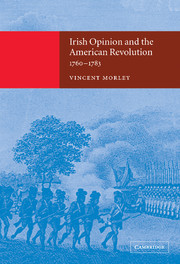Introduction
Published online by Cambridge University Press: 17 July 2009
Summary
An understanding of the evolution of Irish opinion in the early eighteenth century is a prerequisite for any attempt to assess the impact of the American revolution on the outlook of the various sections of the population. The purpose of this introduction is to furnish the necessary benchmark by briefly tracing the evolution of political attitudes during the two generations from the Williamite Revolution to the accession of George III. Although the following account is not based on original research, it offers a view of popular consciousness which differs in important respects from those provided by existing surveys of the period.
Throughout the eighteenth century Irish society was deeply divided along largely coincident lines of ethnic origin, religious belief and political opinion: ‘Our people, are so heterogeneously classed’, wrote one member of parliament in 1775, ‘we are no nation.’ The task of characterising the political outlook of the three principal denominations on the eve of George III's accession could scarcely have been avoided in any event but it is made all the more necessary by the prevalence of representations in the historical literature that distort the true state of opinion in eighteenth-century Ireland. I refer in particular to the general portrayal of the Catholic majority as politically apathetic, the widespread attribution of a tradition of ‘colonial nationalism’ to the dominant Anglican community, and the common tendency to associate Presbyterianism with republicanism.
- Type
- Chapter
- Information
- Irish Opinion and the American Revolution, 1760–1783 , pp. 1 - 39Publisher: Cambridge University PressPrint publication year: 2002

